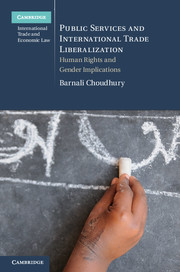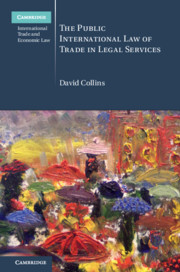Public Services and International Trade Liberalization
Human Rights and Gender Implications
$46.99 ( ) USD
Part of Cambridge International Trade and Economic Law
- Author: Barnali Choudhury, McGill University, Montréal
- Date Published: November 2012
- availability: This ISBN is for an eBook version which is distributed on our behalf by a third party.
- format: Adobe eBook Reader
- isbn: 9781139786768
Find out more about Cambridge eBooks
$
46.99 USD
( )
Adobe eBook Reader
Other available formats:
Paperback, Hardback
Looking for an examination copy?
This title is not currently available for examination. However, if you are interested in the title for your course we can consider offering an examination copy. To register your interest please contact [email protected] providing details of the course you are teaching.
-
Does public service liberalization pose a threat to gender and human rights? Traditionally considered essential services provided by a state to its citizens, public services are often viewed as public goods which embody social values. Subjecting them to market ideology thus raises concerns that the intrinsic social nature of these services will be negated. Moreover, as those most likely to be reliant on public services, public service liberalization may also further marginalize women. Nevertheless, states continue to increasingly liberalize public services. Barnali Choudhury explores the implications of public service liberalization. Using primarily a legal approach, but drawing from case studies, empirical research and gender theories, she examines whether liberalization under the General Agreement on Trade in Services and other liberalization vehicles such as preferential trade and investment agreements compromise human rights and gender objectives.
Read more- Examines public service liberalization through a broader lens than simply GATS liberalization, thereby offering a more contextualized perspective on the key tools of public service liberalization
- Grounds the analysis in a theoretical framework which offers a critical evaluation of the issues instead of simply a criticism
- Views the issues in public service liberalization from both a human rights and gender perspective, highlighting how public service liberalization is more than simply a trade issue
Customer reviews
Not yet reviewed
Be the first to review
Review was not posted due to profanity
×Product details
- Date Published: November 2012
- format: Adobe eBook Reader
- isbn: 9781139786768
- contains: 1 b/w illus. 1 table
- availability: This ISBN is for an eBook version which is distributed on our behalf by a third party.
Table of Contents
Introduction
Part I. Foundations:
1. International economic law and human rights
2. Public services
3. Instruments for liberalizing public services
Part II. Human Rights and Gendered Implications of Liberalization of Public Services:
4. Liberalization of water services
5. Liberalization of educational services
6. Liberalization of health services
7. Accounting for the differential implications of liberalized public services on developing countries and women
Part III. The Future of Liberalization of Public Services:
8. Should public services continue to be liberalized?
9. Conclusion
Index.
Sorry, this resource is locked
Please register or sign in to request access. If you are having problems accessing these resources please email [email protected]
Register Sign in» Proceed
You are now leaving the Cambridge University Press website. Your eBook purchase and download will be completed by our partner www.ebooks.com. Please see the permission section of the www.ebooks.com catalogue page for details of the print & copy limits on our eBooks.
Continue ×Are you sure you want to delete your account?
This cannot be undone.
Thank you for your feedback which will help us improve our service.
If you requested a response, we will make sure to get back to you shortly.
×






